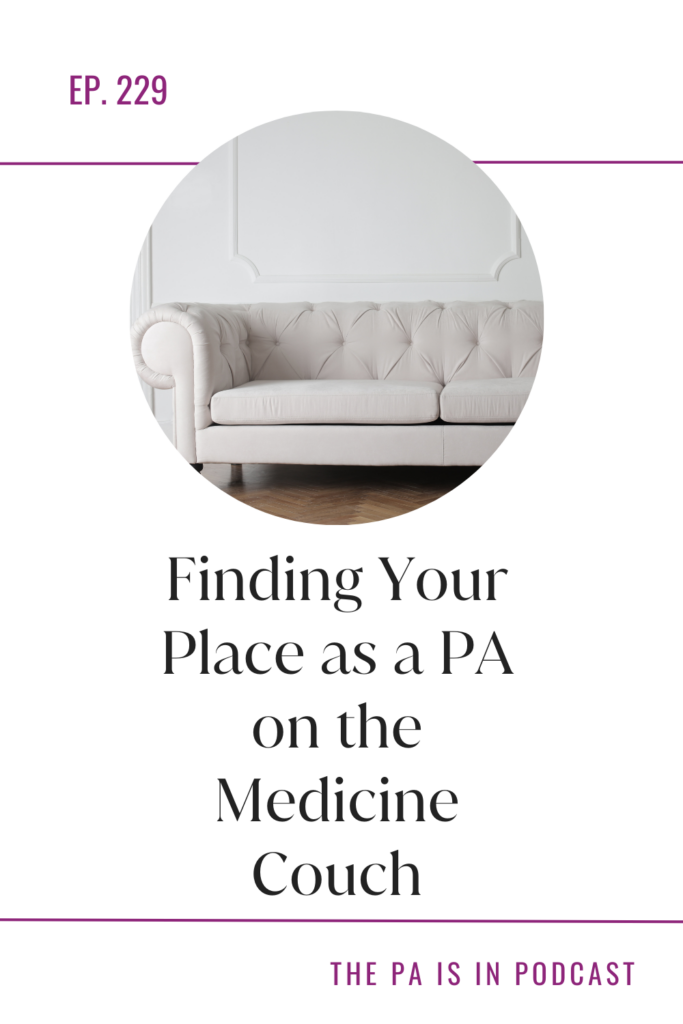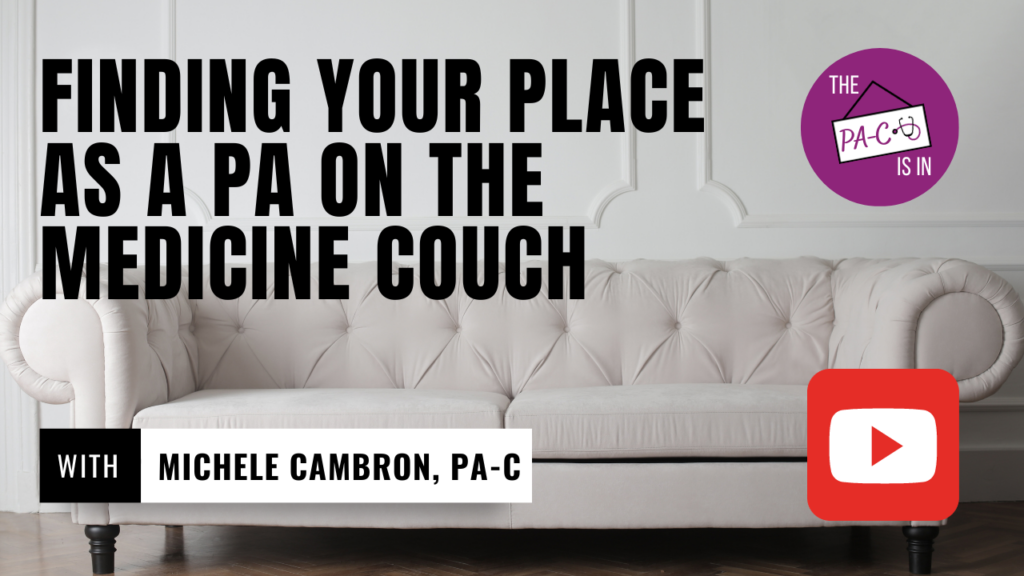
Michele Cambron has been a PA since 2015 and also has her own YouTube channel, The Medicine Couch, where she highlights different medical specialities.
After PA school graduation, Michele looked for a job where she could have a mentor. As a new PA, Michele wanted a mentor and someone who could help teach her and also provide support. She began working in a rural family medicine office where her supervising physician originally said she could fulfill a mentorship role, however that turned out not to be the case. After one year, Michele left that job and started working in urgent care. However, the focus there was on time spent with patients. Michele was limited to only 15 minutes per appointment. So she left that job after 8 months and started working locums in primary care while she looked for her best fit in medicine.
Listen Here: Apple Podcasts | Spotify | Google Podcasts
Watch on YouTube

What To Do When Interviewing
What happens when you start a job and feel like you got sold something on the interview? You thought the job would be one thing when you interviewed, but then when you actually start working there, it isn’t at all what you thought it would be.
When interviewing for a new job, whether you’re a new grad or a seasoned PA, it’s imperative to ask the right questions. It’s important to understand how the practice or department is set up – how much time will you and your SP be dedicating to patient care and clinical work? How much time will your SP actually have for mentoring and teaching? What is the daily workflow like?
One of the best ways to really understand how a practice is run is to talk to previous staff members. If you can, talk to providers who previously worked at the practice, especially PAs and NPs. They can give you great insight into what the daily workflow is like, what your relationship with the SP will consist of, and the values of the practice towards patient care.
The biggest thing you can do during the interview process is to ask to shadow the practice for at least one day, and more than one if you can. You can see the workflow, how the staff works together, and the pace of the office firsthand. After shadowing, reflect on how you feel when you leave for the day. Do you feel drained and wrung out or super keyed up and like you can’t relax?
Feeling Like a Failure
Michele has always been a high achiever, done well in school, and been a model employee in previous jobs. This is why Michele felt like “a failure” after not succeeding at her first two jobs since she left both of them within a year of starting each.
However, Michele reminded herself she’s not a failure. She made it through PA school, which is a great achievement in itself. It’s important to remember that certain jobs suit certain people better than others, whether it’s a particular field of medicine or a medicine-adjacent job. If you leave a job within a year of starting, remember that it’s not your failure, it’s just not the right place for you at the right time. How you want to practice medicine doesn’t fit with the values of this office at this time.
Preventing Turnover
To prevent frequent provider turnover, employees need to spend more time on the front end onboarding new providers, especially teaching new grads things like insurance authorizations and billing that they don’t learn in school. It’s important for administrators to understand the roles of each employer and how they function together.
As a PA, it’s beneficial to spend time with front office staff, MAs, lab staff, etc to see how each of their jobs work, as well as how they interact with your job. This also enables you to have a stronger connection and feel like more a part of a team. You can understand the global view of patient care in that particular practice or office.
The Medicine Couch
After leaving her first two PA jobs, Michele thought that maybe starting in family practice and urgent care was too broad. Instead, she thought working in a specialty would be better for her. She could focus on the same type of diagnoses in each visit and be able to study and learn one specialty instead of many. Michele could have more of a depth of knowledge and familiarity with one specialty. However, she didn’t know which speciality she wanted to work in.
Michele looked for books on how to find the right medical specialty, but could only find books for physicians, where a lot of the material didn’t apply to a PA. Michele wanted to know what it’s like for PA to work in a speciality, what types of procedures they perform, and how much autonomy they have.
Michele couldn’t find a resource like she wanted, so she made her own. She read on different forums and sent out a survey to PAs and NPs. She started writing a book, but then began a YouTube channel as a different way to learn about medical specialities and to try to find her fit in medicine. For now, Michele’s book is on hold, but she is enjoying running her YouTube channel.
On The Medicine Couch, Michele interviews PAs and NPs in different medical specialties, as well as in non-clinical jobs, particularly in medicine-adjacent jobs. She also will occasionally do solo videos on medical apps, CME resources, the new PANRE-LA, etc. Michele also enjoys highlighting “cool and unusual jobs” for PAs and NPs.
Michele asks her guests how other PAs and NPs can get involved in these specialties to help her viewers learn how to gain access to certain jobs. Some opportunities (esp military and government) have age caps, so Michelle wants others to learn about them from a younger age so they can mold their schooling and career to be able to get into these specialities if interested.
Changing Specialties
The ability to switch specialties is often very attractive to PAs and why people decide to become PAs. But how can you actually do this? What is the process?
How can you change specialities without having previous experience in that specialty? Michelle highlights the skills and knowledge needed to move into a different specialty, as well as who to network with.
As a PA, it’s important to be able to identify your different skills and how they can be applied to other fields of medicine. There are many things that make you valuable. By being PAs, we have a great base knowledge of general medicine that can be applied to any specialty.
Michele believes PAs should always be thinking about what’s next, whether that’s in your current practice, a new practice, your next specialty, or how you can grow, learn to be more proficient, or learn new skills. She recommends looking at job boards even if you’re not interested in leaving your current position to have an idea of what benefits could be offered and what other jobs are out there for the future. This also helps to ensure you’re keeping up with the market.
How to Learn a Specialty Without Changing Jobs
One way to gain knowledge and skills in a new specialty without actually getting a new job is to develop a niche practice within your practice. Is there something you really enjoy? You can become the go-to provider for that disease in your practice.
If your colleagues know that you love dermatology, you can become the go-to derm provider in your family medicine practice – other providers will send you their patients for derm issues. This can build your proficiency and resume when you later look for a job in dermatology. You can also take speciality courses to learn more about a speciality you’re interested in.
Doing these things shows a new practice or specialty that you really want this specialty and have a passion for it. On the flip side, it can also help you find out if you really do like this specialty as you spend more time with those types of patients. It’s a low risk way to test a new specialty or role without making a big leap or change.
What Would You Tell Your Younger Self?
Michele says that there are two things that she would tell her younger self looking to go to PA school. One of them is about patient care experience hours needed before going to PA school. Michele had the number of patient care hours needed to apply to PA school, but didn’t think about the quality of those hours. She worked as a tech – taking vitals, managing the flow of rooms, removing IVs, and escorting patients to their cars after their procedures. However, Michele has found that her patient care experience doesn’t apply to her PA career.
Instead, something like being an EMT, doing EKGs, understanding medical terminology by being a scribe, etc. would have better prepared Michele for PA school. This would also have set up a better foundation for starting her PA career. Michele says she would wait an additional year before applying to PA school if that meant better quality patient care experience hours.
Michele’s second piece of advice to her younger self is to understand that her worth as a provider is not necessarily based on how great she is with her patients or how much patient education she gives. In today’s medical world, her worth is based on how many patients she can see and how much money she can generate for the practice or hospital.
The Business of Medicine
Providers are the only employees generating income for the practice. Office staff, environmental services, nurses, etc. are important, but they don’t generate any money. This can put a lot of stress on providers because the onus is on them to generate all the money for the practice.
People go into medicine for the patients and to educate patients on how to take control of their health, but you don’t have time to do that in the business of medicine today. Most people don’t realize this and are naive to the business of healthcare. Practices have a bottom line and metrics to meet. PAs need to know their value and how they contribute to the global practice as well as day to day patient care, which isn’t always measurable.
Administrators have an MBA or business degree and don’t understand the practice of medicine, so it can be hard to advocate for yourself as a PA and why your role is important and has value. This can lead to burnout and provider resentment.
It’s never too late to change course or find where you fit in the medical world. Michele is helping other PAs learn about their options in the medical field and where they can find their best fit.
Connect With Michele
You can find Michele at her YouTube channel, The Medicine Couch